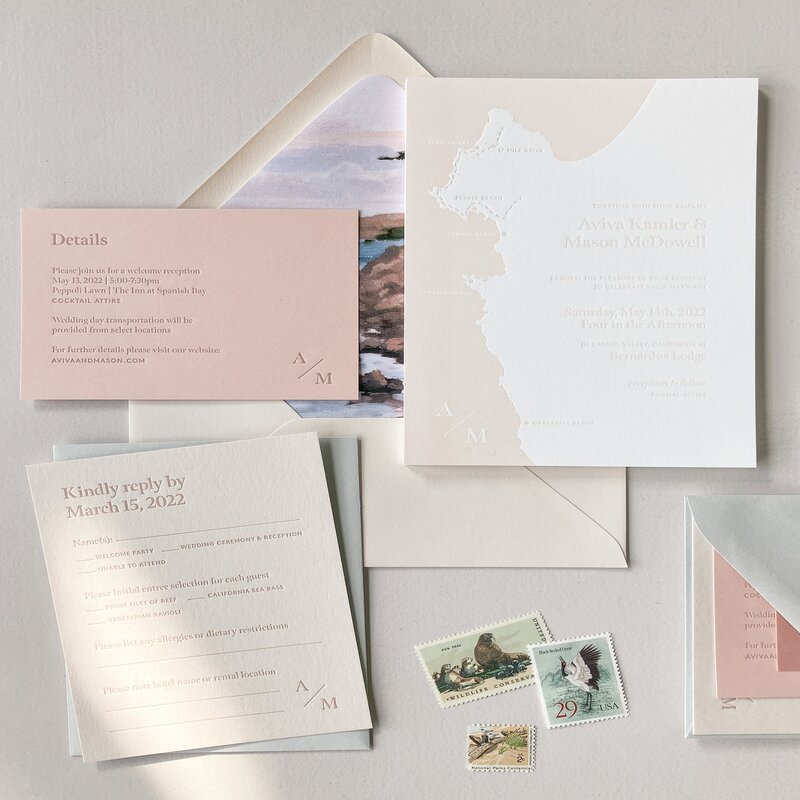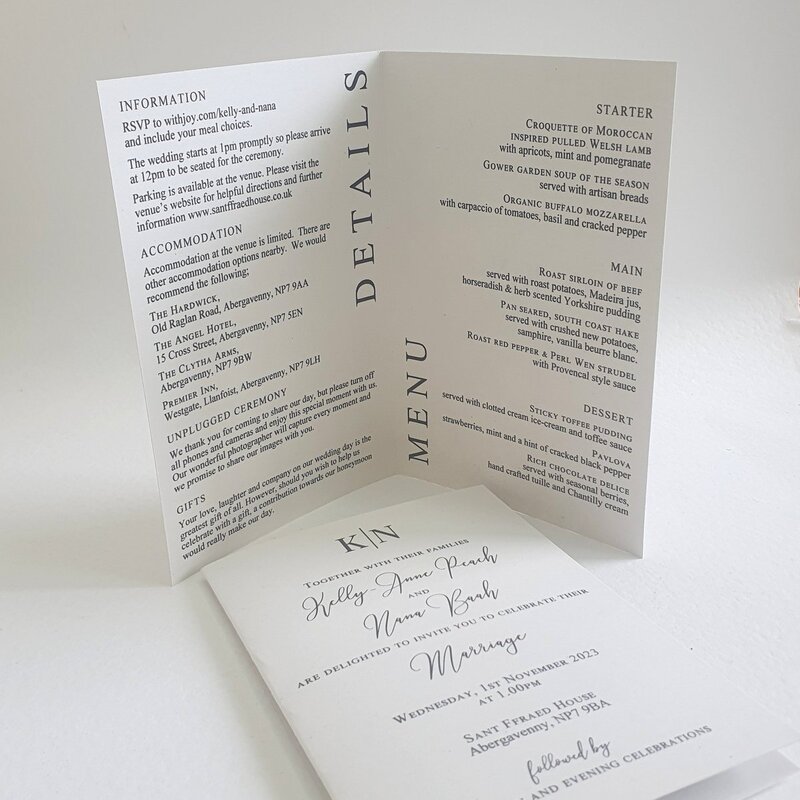The Recommended Timeline for Sending Wedding Invitations
How far out do you send wedding invitations? When planning your wedding, timing your invitations correctly is key to ensuring a smooth celebration.
Early Considerations: Save the Date
Sending ‘save the date’ cards early can solidify the initial announcement of your big day. Aim to dispatch these about 6 to 8 months before, or even a year ahead for destination weddings. This early notice helps guests to mark their calendars and start making preliminary arrangements, particularly if they need to travel.
Main Invitations Based on Guest Numbers
The number of guests can influence how early you send the main invitations. If you’re hosting a large wedding, it’s advisable to send these invitations 3 to 4 months prior to the wedding. This gives your guests ample time to RSVP and make necessary preparations. For smaller, more intimate weddings, 2 to 3 months before the event might be sufficient, especially if you have already sent ‘save the date’ notices.

Factors Influencing Your Invitation Timeline
When planning your wedding, several key factors can affect when to send out invitations.
Importance of Wedding and Holiday Seasons
Consider the season of your wedding. During peak wedding months, send invites earlier. Your guests may have packed schedules. They will appreciate the ample notice.
Destination Weddings: Special Considerations
For abroad weddings, send invitations much earlier. Guests will need time for travel plans and budgeting.
Venue and Caterer Deadlines
Your venue and caterer will need final guest numbers. Make sure to allow time for collecting RSVPs and providing these details well before their deadlines.
Effective Communication Strategies
When planning a wedding, effectively communicating the details to guests is crucial for a smooth experience.
Utilizing Modern Tools: Social Media and Electronic Invitations
Modern tools such as social media platforms and electronic invitations make it easier to reach out to guests quickly. They serve as a handy way to send reminders, updates, and even collect RSVPs digitally. Consider creating a Facebook event or sending out e-invites to complement traditional methods.
Traditional vs. Modern Invitation Methods
Balancing traditional paper invitations with modern digital methods can enhance the overall communication strategy. While paper invites bring a personal touch, digital tools offer convenience and speed. Determine the best mix based on your guest demographics and preferences.

Managing Guest Responses and Adjustments
After send out your wedding invitations, prompt and efficient management of guest responses is crucial. This stage is where you track RSVPs and confirm who will be attending. It’s also where you’ll handle any last-minute changes to your guest list. Effective management ensures that you’ll have accurate numbers for your caterers and venue, and also helps you maintain your seating arrangements and other logistical details.
RSVP Tracking and Confirmations
Keeping track of RSVPs is essential for finalizing your guest list. Create a system that allows you to easily update who has responded and who hasn’t. Here are your steps:
- Choose a tracking method, such as a spreadsheet or wedding planning app.
- Regularly update your tracker as responses come in.
- Set a deadline for RSVPs and send reminders to those who haven’t responded.
Stay organized and be persistent. Follow up with guests as needed to ensure you get all responses on time.
Dealing with Last-Minute Changes
Despite your best efforts, last-minute changes to the guest list are inevitable. It’s important to be flexible and have a plan for handling these updates. Here’s what you can do:
- Confirm a process for guests to notify you of any changes.
- Determine a cut-off point for changes to avoid disruption.
- Have a backup list of guests who can fill in if there are any late cancellations.
Remember to communicate clearly with your guests about any adjustments. Keep your venue and caterer informed of the final guest count and any special requests.
By tracking RSVPs diligently and being prepared for last-minute changes, you can manage your guest responses effectively. This careful attention to detail will contribute to the success of your wedding day.
Final Recommendations for Timely Invites
When wrapping up your wedding invitation schedule, precision is crucial. Here are some key steps to consider:
- Timeline Review: Double-check your invitation timeline. Make sure it aligns well with your wedding day. This guarantees that all guests can make necessary arrangements.
- Count Buffers: Always include a buffer period in your invitation schedule. Guests might delay their responses, or unforeseen issues could arise.
- Late Invitations: Try to avoid send wedding invitations too late. This might inconvenience your guests, especially those who need to travel.
Checklists and Reminders to Avoid Common Pitfalls
Checklists can be a powerful tool to ensure nothing is overlooked in the rush of wedding planning:
- RSVP Checklist: Keep a detailed list of who has responded to your invitations. This helps avoid the confusion of tracking later.
- Reminder Setup: Set up automatic reminders for yourself to send follow-ups. This keeps your RSVP collection on schedule.
- Invitation Proofing: Always double-check your invites for accuracy before sending them. This prevents errors that could confuse or misinform your guests.
Final Thoughts on Seamless Invitation Planning
Concluding, effective invitation planning can dramatically enhance the experience for both you and your guests. Remember to:
- Stay Organized: Use tools and apps to keep your planning tidy and accessible.
- Keep Communication Open: Regularly update your guests on any changes in the wedding arrangements.
- Final Touches: Give your invitation one last review before sending them out. This ensures perfection in your delivery.
Following these steps will help ensure a smooth path to your big day, and allow you to focus on the joy of the occasion. Keep these tips in mind to navigate through the intricate process of wedding planning.

Finalizing the Guest List and Logistics
Compiling the Guest List
Once you have received the RSVPs, it’s time to finalize your guest list. This is a significant step in your wedding planning process. You’ll need a confirmed headcount to ensure all logistics are in place. Factors like seating arrangements and meal selections are directly influenced by this number.
Make sure to communicate with your vendors regarding the final headcount. This includes your caterer, venue manager, and any others involved. Having a confirmed guest list not only demonstrates professionalism but also helps ensure a smooth flow on the day itself.
Packing and Sending Invitations
Now it’s time to send out your invitations. You might want to consider paying attention to the details in packaging. Perfectly crafted invitations deserve a proper presentation. Quality envelopes can create a lasting impression. Don’t forget to include postage, and double-check that the mailing address is correct.
Mailing out your invitations can be exciting yet nerve-wracking. As soon as they’re in the mail, you’ll want to keep track of RSVPs and maintain communication with your guests. By staying organized, you’ll smooth out the final countdown leading to your special day.
Conclusion: Timing is Key
In conclusion, understanding when to send your wedding invitations can significantly impact your wedding planning. Start by recognizing standard timelines involving local and destination weddings. Remember to consider special circumstances that may affect your timing. Crafting the perfect invitation requires attention to detail, from wording to design. Don’t underestimate the importance of an effective RSVP process for organizing your guest list.
With everything in line, you’ll find that keeping things organized increases the excitement leading up to your wedding. By sending your invitations at the right time, you’re setting the stage for a memorable celebration. Proper planning can ease stress and let you focus on the joy of your upcoming journey as a married couple. By adhering to these guidelines, you foster a positive wedding experience for yourself, your loved ones, and all your guests!
